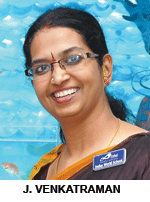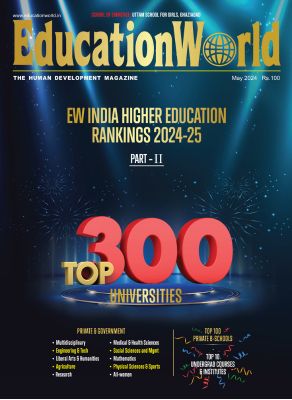 Media reports and comments on the rising incidence of cybercrime make me very uneasy. As principal of a school, I believe it’s my moral responsibility to ensure our students are empowered by professionals to challenge and combat cybercrime, writes Jayshree Venkatraman
Media reports and comments on the rising incidence of cybercrime make me very uneasy. As principal of a school, I believe it’s my moral responsibility to ensure our students are empowered by professionals to challenge and combat cybercrime, writes Jayshree Venkatraman
A welcome recent development was a multi-school cyber crime awareness programme conducted by Quick Heal, a Pune-based organisation which produces internet security and antivirus software, at the DAV Public School, Pune, for middle school (classes VIII-IX) and higher secondary students. The Q&A session with middle school students was inspiring. But after the session with secondary students, I came to the conclusion that interest in the subject is inversely proportional to age. Senior school students tended to have a been-there-done-that attitude which adversely affected their learning outcomes.
As a mentor of students, I appreciate the need for knowledge sharing and IT education enhancement since a growing number of students in the 14-16 age group manage online financial transactions for their parents. Owing to lack of skills to manage new technologies, a large and growing number of parents get their children to do online monetary transactions, readily passing on the sacrosanct password to them. This makes youth vulnerable to fraudsters and villains stalking the cyber world for gullible prey.
While the tech-savvy knowledge and skills of contemporary school students is admirable, it’s a cause for anxiety that most teachers don’t possess enough understanding of the subject to caution or protect students of the consequences of abuse of their affinity with cyber technology. In the Quick Heal workshop, students had a better grasp of the subject matter than teachers.
I strongly believe knowledge should flow from higher to lower levels and that teachers have to be placed on a high mental pedestal by students. Now with information available at the click of a mouse, and the easy compatibility of youth with new digital technologies, the position of teachers in students’ perception has surely altered with teachers no longer regarded as fonts of wisdom. In 21st century India where almost all gadgets and gizmos are best operated by children, it’s become a matter of pride for parents to broadcast their children’s cell phone, ipad expertise with most parents and elders unashamed to admit to being taught to operate electronic devices by their children. This development offers children and youth numerous opportunities to proclaim superiority over their elders.
No previous generation has experienced this conflict. We were raised to remain in awe of parents and elders and to obey their advice and directives, until we attained adulthood. We always knew there was nothing we could do better than our parents or teachers and it was easy to follow their advice and dictates.
I shared these musings with a group of students in the 14-17 age group recently. The feedback indicated that they believed the last two decades of the 20th century were definitely a better period for growing up. They opined that obedience to higher authorities would have made life much simpler for them. In this day and age, unquestioning acceptance of authority and experience is difficult. Today students demand information before accepting an opinion or start work on an assignment. When Sourabh, a class IX student of my school was asked to write a set of difficult Hindi words five times, he questioned his teacher’s reasoning for making the exercise mandatory.
Read: How to ensure cyber security for your kids
Yet, I was inclined to accept Sourabh’s explanation that he wasn’t being disrespectful. It’s just that the framework and equation of teacher-pupil relationships have transformed in the new age of ubiquitous digital technology. Unquestioning surrender to the wisdom of authority has changed to surrender after much questioning, which is not necessarily a change for the worse. In this context, it’s pertinent to bear in mind that even Lord Krishna was not spared this teacher’s obligation and was made to render famous passages of the Bhagavad Gita to persuade the warrior Arjun to discharge his duty of waging war on the forces of evil.
In short, the quality of teacher-pupil relationships hasn’t deteriorated. But student demands for communication and information have risen. Communication and exchange of information has become the new lifeline of teacher-pupil relationships. Explanations have become necessary and clarifications mandatory.
This is neither a better or worse change, it’s just a new phenomenon. These are turbulent times for the young generation whose concerns have to be addressed and queries satisfied. As parents and teachers in the new digital age, we should accept change gracefully. We have to adjust our mindsets to accept the transition from being teachers to mentors and candidly admit our relative ignorance of new digital technologies.
Trust is the basis of the newly emergent teacher-pupil relationship. But trust can’t be taken for granted. Information and credibility have become the basis of trust, and hence the basis of all teacher-pupil relationships.
(Jayshree Venkatraman is the principal of the Indus World School, Pune)

























